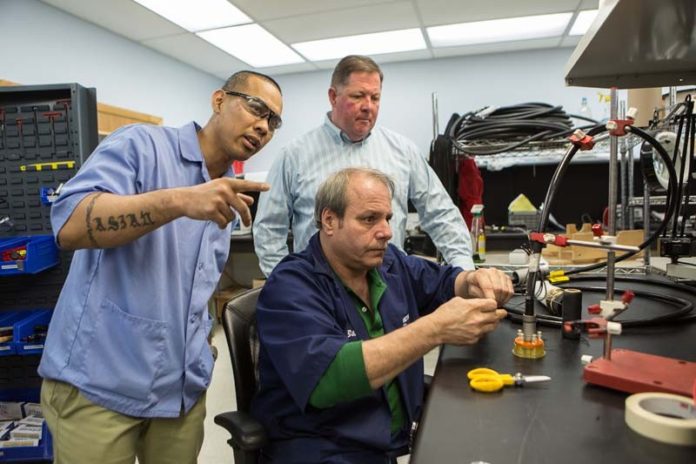
Today’s submarines are billion-dollar boats that can dive to more than 1,500 feet beneath the sea and stay submerged for months at a time.
That should give some idea of the technological demands at Ametek SCP Inc., a Westerly company that makes undersea connectors, including some that are used in submarine fleets around the world. The lives of sailors and workers on oil rigs, national defense and a whole lot more are riding on the company’s work.
At Ametek, manufacturing doesn’t mean stamping out one part after another assembly-line style. Instead, each item is custom-designed, and there are inspections every step of the way. It could take up to eight months to fill an order.
“Everything we make is for a sub-sea environment,” said Paula Christina, sales director. “These parts support submarines and deep-well oil platforms. Everything must be able to withstand exposure to salt water, various temperatures and enormous pressure.”
Founded in 1993, Ametek is a division of Ametek Inc., a global manufacturer of electronic and electromechanical devices with annual sales of $3.6 billion and more than 120 manufacturing locations around the world. Ametek frequently works with other defense contractors, including Raytheon in Massachusetts, Lockheed Martin in Maryland and Electric Boat, the submarine builder with operations in Rhode Island and Connecticut.
Ametek acquired the local company in 2007. Today Ametek employs 63 people – 28 of them in manufacturing jobs – and the business is thriving. The company not only supports the United States submarine fleet, but those in the United Kingdom, Canada, Australia, Brazil, France and Spain as well.
In recent years the company has emerged as one of Rhode Island’s top exporters. Its export numbers topped $7.2 million in 2011, $8.7 million in 2012, and $8.2 million in 2013. Those figures are expected to grow, as forecasters predict the world submarine fleet will continue to expand, with perhaps 50 more boats to be built over the next 15 years. Ametek expects to receive more naval work from its established customers. In addition, the company has leveraged past experience working on the U.K.’s Astute Class submarine program to bring in more navy work from Spain, and win new assignments from South Korea. Indonesia is seen as a prospective new client as well.
A top Ametek product is hull penetrators for submarines, which allow wires, pipes and tubes to extend from the outside of a boat to the inside, something especially important with today’s communication technologies.
The rugged fiber-optic feed-thru can withstand pressure up to 30,000 pounds per square inch and temperatures as high as 300 degrees Celsius. Though developed for drilling, the technology may also be used for submarine hull penetrators.
The new technology means the company’s market for undersea drilling and exploration equipment is growing, too. The oil and gas industry in Norway is now a top prospective client for Ametek.
As a result of new product development and new opportunities, Ametek expects to see a 160 percent growth in sales this year. At the same time, Operational Excellence Teams define specific strategic goals every year, including rationalizing operations. In recent years, the achievement of these strategic goals has led to savings of $189,000 in 2013 and $207,000 in 2012.
The number of advanced manufacturing jobs in Westerly is growing. Employment is expected to increase 10 percent in 2014. “We’re hiring people right now,” Christina said. “We’re looking for a solderer, an intern draftsman and a fiber-optics lead person.”
Wages for top manufacturing positions reach $28 per hour. Benefits include health, dental and vision plans, 11 paid holidays a year and a 50 percent company match for employees’ contributions to their 401(k) plans. Workers get extensive training in all the company’s processes, as well as government standards. Solderers are retrained every two years.
The company boasts an impressive workplace safety record as well. The Westerly operation has gone more than 1,100 days without an accident. New hires get extensive training in evacuation procedures, hazardous spill procedures, use of fire extinguishers and safety gear, and hazard communications. As a safety incentive, the company holds raffles to celebrate every accident-free month. Prizes range from $50 to $100. After every 90 days without an accident, the awards jump to as much as $2,000.
The company’s manufacturing facility in Westerly covers 32,000 square feet, and includes a U.S. Navy-certified molding operation and extensive testing facilities. Supply-chain management is a top priority. Ametek reviews orders a year in advance to help suppliers schedule their production.
Science education is a big part of Ametek’s community outreach effort. Through a program called Science Explorers, employees visit grammar schools and middle schools to teach classes and lead kids through science experiments. The company is also a top sponsor of a summer learning camp in Westerly.
The company views Rhode Island as a great place to do business, according to Christina. “We really owe a lot to the R.I. Commerce Corporation, the agency that replaced the EDC,” she said. “They do a lot to promote international business. And they have a Procurement Technical Assistance Center that helps companies understand the government’s contractual requirements. That’s a big help for the small contractors we work with.
“We’ve got a great team here. Our people are very dedicated to the quality of their work. They understand our products are critical, and it really shows,” Christina said. •










